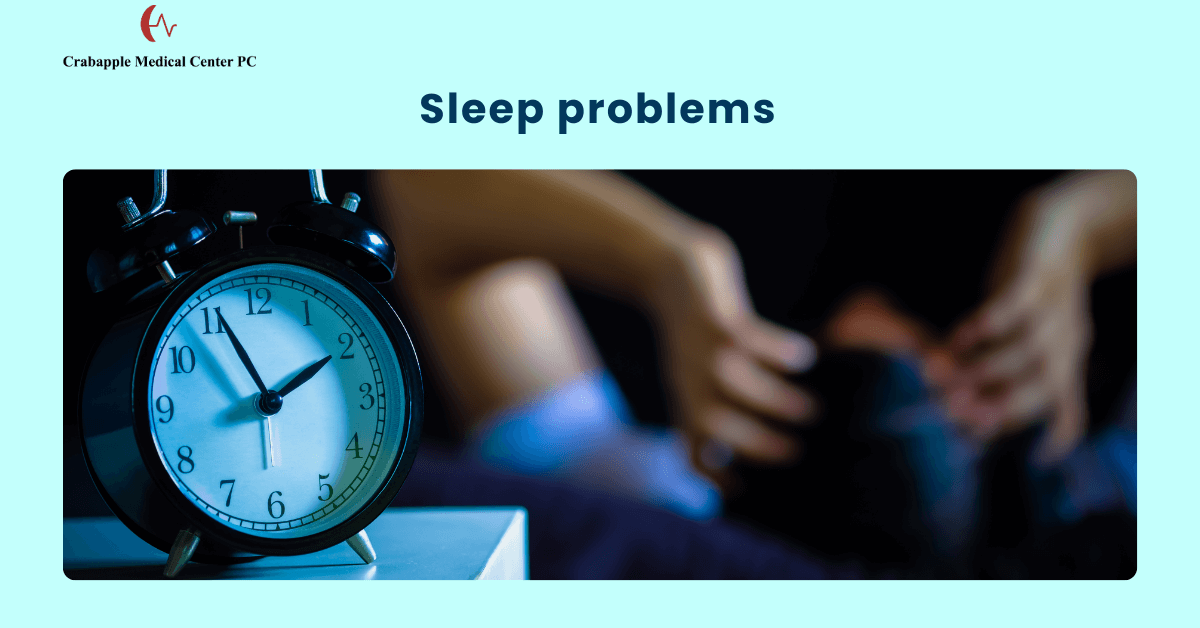Mental health affects every part of our lives, our relationships, productivity at work, school performance, and even our physical well-being. Anxiety and depression are among the most common mental health conditions, yet they are often misunderstood, minimized, or dismissed as simply “stress” or “feeling down.”
At Crab Apple Medical Center in Alpharetta, GA, we believe no one in our Alpharetta community should suffer in silence. Learning to recognize the early warning signs and understanding when to seek help can make a life-changing difference. Early support not only accelerates recovery but can also prevent symptoms from becoming more severe or long-lasting.

Understanding Anxiety and Depression
Anxiety is more than the normal, occasional worry most people feel before a big presentation or stressful event. Clinical anxiety involves persistent, excessive fear, nervousness, or dread that interferes with daily activities, relationships, and overall functioning. It may come with physical symptoms like a racing heart, muscle tension, stomach distress, or trouble sleeping.
Depression, likewise, is not simply “feeling sad” for a couple of days. It is a persistent low mood, emptiness, or loss of interest or pleasure that lasts weeks or even months. Depression can affect how you think, feel, and behave. It can also manifest physically — through fatigue, appetite changes, or aches and pains with no clear medical cause.
Together, anxiety and depression affect millions of Americans each year, cutting across age, gender, and background. They can arise from many factors:
- Genetics or a family history of mental health conditions
- Stressful life events such as loss, trauma, or major transitions
- Medical conditions or chronic illness
- Hormonal changes such as postpartum or perimenopause
- Substance use or withdrawal from substances
Recognizing the symptoms early, understanding that these are medical conditions (not personal weaknesses), and seeking help promptly are the first steps toward healing. With the right support and care, recovery is possible, and quality of life can improve dramatically.
Common Signs of Anxiety
Anxiety can look different from person to person, but there are some hallmark symptoms. When these symptoms last for weeks or interfere with your daily life, it’s time to take notice:
- Persistent worry or nervousness:
- Feeling “on edge” most of the day or having a sense that something bad is about to happen even without clear reason.
- Racing thoughts and trouble concentrating: Your mind feels like it won’t stop, making it hard to focus at work, in class, or at home.
- Irritability or restlessness: Feeling unusually snappy, tense, or unable to relax.
- Physical symptoms: Rapid heartbeat, sweating, headaches, stomach upset, muscle tension, or frequent trips to the bathroom can all be linked to anxiety.
- Avoidance behaviours: Cancelling plans or staying away from people, places, or situations that trigger worry.

- Sleep problems: Difficulty falling asleep, waking up repeatedly during the night, or experiencing nightmares.
Recognizing these warning signs allows you and your healthcare provider at Crab Apple Medical Center to address anxiety before it disrupts your daily life.
Common Signs of Depression
Depression is more than sadness; it affects mood, thinking, behaviour, and physical health. Look for these signs, especially if they persist for two weeks or more:
- Persistent low mood or emptiness: Feeling sad, hopeless, or “numb” nearly every day.
- Loss of interest or pleasure: Activities you once enjoyed (socializing, hobbies, sex) no longer feel rewarding.
- Changes in appetite or weight: Unintended weight gain or loss, or eating much more or less than usual.
- Fatigue or loss of energy: Even after sleeping, you feel exhausted and unmotivated.
- Sleep disturbances: Sleeping too much, waking up early, or not being able to sleep at all.
- Difficulty concentrating: Slowed thinking, forgetfulness, or indecisiveness.
- Feelings of worthlessness or guilt: Harsh self-criticism or believing you’re a burden to others.
- Thoughts of self-harm or suicide: Any mention or thought of harming yourself requires immediate help by calling 988 in the U.S. or going to the nearest emergency room.
If you recognize these symptoms in yourself or someone you care about, know that depression is treatable. Early assessment and care at Crab Apple Medical Center in Alpharetta can help you feel like yourself again.
How Anxiety and Depression Can Affect Your Physical Health?
- Increased risk of heart disease, high blood pressure and weakened immunity
- Higher incidence of chronic pain, digestive issues and headaches
- Disrupted sleep patterns that worsen mood and energy levels
- Strained relationships and workplace performance
Take the First Step Toward Mental Wellness
Feeling anxious or down can be overwhelming, but you don’t have to face it alone. Crab Apple Medical Center in Alpharetta offers confidential mental wellness appointments with experienced providers who care.
When to Seek Professional Help
It can be difficult to know when stress, sadness, or worry crosses the line into a mental health condition that needs professional support. A good rule of thumb: if symptoms last more than two weeks, feel overwhelming, or interfere with daily life, it’s time to reach out for help.
You should consider seeking professional support if you experience:
- Persistent symptoms: Feelings of sadness, worry, or anxiety that last more than two weeks and do not seem to improve on their own.
- Interference with daily life: Difficulty performing at work, school, or maintaining healthy relationships because of mood or anxiety.
- Panic attacks or overwhelming anxiety: Episodes of intense fear, racing heartbeat, or breathlessness that feel out of control.
- Thoughts of self-harm or suicide: Any thoughts of hurting yourself or not wanting to live require immediate attention — call 988 in the U.S. or go to the nearest emergency room.
- Physical complaints: Ongoing headaches, stomach issues, appetite or weight changes, or fatigue that may be tied to anxiety or depression.
- Unhealthy coping: Increasing reliance on alcohol, drugs, or overeating to manage emotions.
- Chronic conditions worsening: If anxiety or depression is making it harder to manage existing health problems such as diabetes, high blood pressure, or chronic pain.
How Crab Apple Medical Center Can Help?
At Crab Apple Medical Center in Alpharetta, GA, we understand that taking the first step toward mental health care can feel overwhelming. That’s why we’ve built a supportive, confidential environment where you’re treated with respect and compassion from the moment you walk in. Our multidisciplinary team works closely with you to create a plan that fits your unique needs and goals.
We can help you through:
Comprehensive mental health screenings:
Our providers use evidence-based questionnaires and one-on-one discussions to evaluate anxiety, depression, and related conditions. This ensures we have a clear understanding of your symptoms and how they affect your daily life.
Personalized treatment options:
Based on your evaluation, we offer or coordinate evidence-based treatments. These may include medication management, counseling referrals, lifestyle strategies like sleep and stress coaching, and nutritional support to complement mental health care.
Collaboration with mental health specialists:
If you need specialized therapy or psychiatric care, we coordinate seamlessly with trusted therapists, psychiatrists, and support services in the Alpharetta area to ensure continuity of care.
Ongoing monitoring and support:
Mental health treatment works best when it’s monitored over time. We offer follow-up visits, check-ins, and adjustments to your care plan to track your progress, address challenges, and celebrate your successes.
At Crab Apple Medical Center, we are your partners in mental wellness; not just for today but for the long-term. Our goal is to help you feel supported, heard, and empowered as you move toward better mental and physical health.
Self-Help and Lifestyle Strategies
While professional care is essential for moderate to severe anxiety and depression, healthy daily habits can strengthen resilience, improve your mood, and enhance treatment results. Try incorporating these evidence-based strategies into your routine:

Stay active:
Regular physical activity such as walking, swimming, cycling, or yoga improves circulation, boosts endorphins, reduces stress hormones, and supports better sleep. Even 20–30 minutes a day can make a noticeable difference in mood and energy.
Balanced nutrition:
Foods rich in omega-3 fatty acids, complex carbohydrates, and a variety of colorful vegetables provide essential nutrients for brain health. A balanced diet can stabilize blood sugar, reduce inflammation, and support emotional well-being.
Prioritize sleep hygiene:
Go to bed and wake up at consistent times, keep your bedroom cool and dark, and limit screen time at least an hour before bed. Quality sleep restores both your body and your mind.
Mindfulness and relaxation:
Practices like deep breathing, meditation, progressive muscle relaxation, or gentle yoga help lower stress hormones and teach your body how to return to a calm state after anxiety spikes.
Build social support:
Stay connected with family, friends, faith groups, or local support groups. Talking to someone you trust reduces feelings of isolation and creates a valuable safety net.
These habits cannot replace professional treatment, but they complement therapy or medication and help you feel stronger, calmer, and more in control of your well-being.
Breaking the Stigma
Many people hesitate to seek help for mental health concerns because of lingering stigma or misconceptions. They may fear being judged, misunderstood, or seen as “weak.” At Crab Apple Medical Center, we want our community in Alpharetta to know the truth: anxiety and depression are medical conditions, not personal failures.
Just like heart disease or diabetes, mental health conditions are the result of complex factors such as genetics, brain chemistry, life experiences, and stress. They are not a character flaw or a sign of weakness and they are highly treatable.
Seeking help is a sign of strength. Treatment works, and recovery is possible with the right combination of support, therapy, medication (if needed), and healthy lifestyle changes. By taking the first step toward help, you not only improve your own quality of life but also help normalize mental health care for others in your family and community.
Taking the First Step Toward Better Mental Health
Anxiety and depression can feel overwhelming, but you don’t have to face them alone. Recognizing the signs early and reaching out for support can change the course of your life. At Crab Apple Medical Center in Alpharetta, GA, we are committed to helping you or your loved ones understand symptoms, access effective care, and find hope in recovery. Whether you’re experiencing new changes in mood, ongoing stress, or worsening mental health, our compassionate team is here to listen, guide, and support you every step of the way.
Schedule a Confidential Mental Health Check-Up
If you’re unsure whether you’re dealing with anxiety, depression, or stress, our team at Crab Apple Medical Center can help you understand what’s happening and guide you toward treatment.
Frequently Asked Questions
What are the common signs of anxiety or depression I should watch for?
Persistent sadness, loss of interest in activities, trouble sleeping, irritability, feeling on edge, racing thoughts, or unexplained physical symptoms like headaches or stomach problems may signal anxiety or depression.
When should I seek professional help for my mental health?
If symptoms last more than two weeks, interfere with work or relationships, or cause distress, it’s time to speak with a provider. If you’re in crisis or thinking of harming yourself, seek immediate help or call 911.
Does Crab Apple Medical Center offer confidential mental health appointments?
Yes. All mental health screenings and consultations at Crab Apple Medical Center are confidential. We respect your privacy and treat you with compassion.
What treatments for anxiety or depression does Crab Apple provide?
Our providers screen for anxiety and depression, offer initial counseling support, prescribe medications when appropriate, and coordinate care with trusted local therapists and specialists.
Can I get help even if I’m not sure what I’m feeling is anxiety or depression?
Absolutely. You don’t have to have a diagnosis before making an appointment. We can help you identify what’s going on and guide you to the right care.

